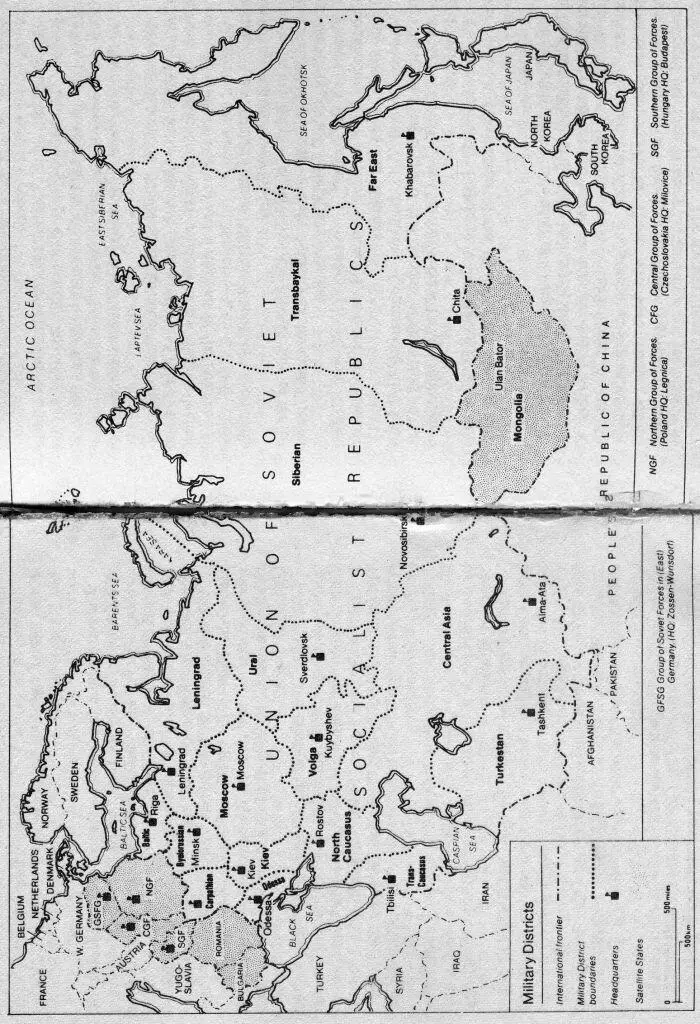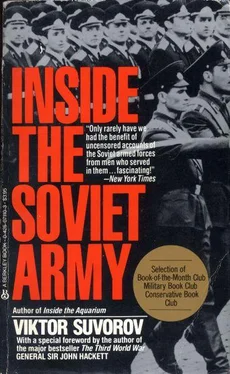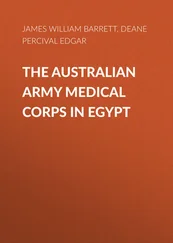There can be no doubt that the organisation known as the `Headquarters of the GSFG' in peacetime would become, not a Front Headquarters, but the Headquarters of the Western Strategic Direction.
It is significant that, already in peacetime, the Headquarters of the GSFG controls two Tank Armies and one Shock Army (essentially another Tank Army). For each Front can have only a single Tank Army and in many cases it does not have one at all. The presence in GSFG of three Tank Armies indicates that it has been decided to deploy at least three Fronts in the area covered by this Direction. Is this sufficient? Yes, for in a war the Commander-in-Chief of the Western Strategic Direction would have under his command not only all the Soviet troops in East Germany but all those in Czechoslovakia and Poland, together with the entire complement of the German, Czech and Polish armed forces, the Soviet Baltic Fleet and the Byelorussian Military District. This will be discussed in greater detail. For the present it is sufficient to note that the Group of Soviet Forces in Germany is an organisation which is regarded by the Soviet leadership as entirely different from any other Group of forces. No other force-in Poland, Czechoslovakia, Mongolia, Cuba, Afghanistan or, earlier, Austria or China-has ever been headed by a Commander-in-Chief. All these Groups were headed by a Commander.
Let us list the Generals and Marshals who have held the post of Commander-in-Chief of the Soviet Group of Forces in Germany:
Marshal G. K. Zhukov, the former Chief of the General Staff, who became First Deputy to the Supreme Commander and subsequently Minister of Defence and a member of the Politburo, the only man in history to have been awarded the title of Hero of the Soviet Union four times.
Marshal V. D. Sokolovskiy, former Chief of Staff of the Western Strategic Direction and later Chief of the General Staff.
General of the Army V. I. Chuykov, subsequently a Marshal and Commander-in-Chief of the Land Forces.
Marshal A. A. Grechko, later Minister of Defence and a member of the Politburo.
Marshal M. V. Zakharov, later Chief of the General Staff.
Marshal P. K. Koshevoy.
General of the Army V. G. Kulikov, later a Marshal, Chief of the General Staff and then Commander-in-Chief of the Warsaw Treaty Organisation.
Only one of this galaxy rose no higher-Marshal Koshevoy, who became seriously ill. But to reach the rank of Marshal is no mean achievement-and it was in Germany that he received the rank of Marshal, at a time when other Groups of forces were commanded only by Lieutenant-Generals and Colonel-Generals. Thus Koshevoy, too, stands out from the crowd.
One rule applied to all-anyone who held the post of Commander-in-Chief of the GSFG was either a Marshal already, was promoted to this rank on appointment or was given it shortly afterwards. Nothing of this sort has occurred with other Groups of forces.
The GSFG is a kind of springboard to the very highest military appointments. Commanders of other groups have never achieved such high standing. Moreover even the Commanders-in-Chief of the Land Forces, of the Air Forces, Fleet, Rocket Troops or Air Defence have never had such glittering careers or such future prospects as those who have been Commanders-in-Chief in Germany.
Surely this is enough to indicate that in wartime something far more powerful will be set up on the foundation represented by the GSFG than in the other, ordinary, Military Districts and Groups of forces?
None of the other Military Districts and Groups of forces have Commanders-in-Chief-only Commanders. Does this mean that in peacetime there are no Strategic Directions? Not at all. The Headquarters of the Western Strategic Direction (HQ, GSFG) is hardly concealed at all while the existence of the other Strategic Directions is only lightly camouflaged, as was `Colonel-General Vasilyev's Group'. But it is easy to see through this camouflage.
It is sufficient to analyse the careers of those commanding Military Districts. One can then see that, for the overwhelming majority, command of a District represents the highest peak they will reach. Those who advance further are rare. In some cases what follows is honourable retirement to posts such as Director of one Military Academy or another or an Inspector's post in the Ministry of Defence. Both these types of appointment are seen as `elephants' graveyards'. They represent, in fact, the end of any real power.

However one of the sixteen Military Districts is a clear exception. None of its former Commanders has ever left for an elephants' graveyard. On the contrary-the Kiev Military District is a kind of doorway to power. Here are the careers of all those who have commanded this District since the war:
Colonel-General A. A. Grechko became Commander-in-Chief of GSFG and a Marshal, Commander-in-Chief of Land Forces, Commander-in-Chief of the Warsaw Treaty Organisation, Minister of Defence and a member of the Politburo.
General of the Army V. I. Chuykov-C-in-C GSFG, Commander, Kiev Military District, Marshal, C-in-C of Land Forces and Deputy Minister of Defence.
Colonel-General P. K. Koshevoy-First Deputy to the C-in-C GSFG, Commander, Kiev Military District and General of the Army, C-in-C GSFG, and Marshal.
General of the Army I. I. Yakubovskiy-C-in-C GSFG, Commander, Kiev Military District, C-in-C of the Warsaw Treaty Organisation and Marshal.
Colonel-General V. G. Kulikov-Commander Kiev Military District, C-in-C GSFG and General of the Army, Chief of the General Staff, C-in-C of the Warsaw Treaty Organisation and Marshal.
Colonel-General G. I. Salmanov-Commander Kiev Military District, Commander of the Trans-Baykal Military District.
Surprisingly, as we have been following the brilliant careers of the Commanders of the Kiev Military District, we have come across some old friends, whom we met previously as C-in-C GSFG. Strangely, there has been an interchange of Generals between Wünsdorf and Kiev. Those who have gone to Kiev have later gone to GSFG. Those who have reached GSFG without going to Kiev have done so later. However, a Commander of the Kiev Military District does not see himself as junior to the C-in-C GSFG. The journey from GSFG to Kiev is not demotion and for many it has represented promotion. Chuykov, for instance, was C-in-C GSFG as a General and was made a Marshal when he moved to Kiev.
But perhaps the Kiev Military District is of greater numerical strength than the others? Not at all-Byelorussia has more troops and the Far Eastern Military District has more than both the Kievan and Byelorussian put together. In territory Kiev is one of the smallest of the Districts. The Siberian District is sixty-seven times as large and Moscow District is far more important. But the Commander of the Moscow, Siberian, Far Eastern, Byelorussian and the other Military Districts cannot even dream of the prospects which stretch before Commanders in Kiev. In the last twenty years not one of the Commanders of Moscow District has become a Marshal, while all but one of those from Kiev have done so, the exception being the most recent who is still young and who will certainly soon be promoted.
Why is there such a sharp contrast between the Kievan and the fifteen other Districts? Simply because the organisation designated Headquarters Kiev Military District is in fact the Headquarters of the South-Western Strategic Direction, which in the event of war would take control not only of the troops already on its territory, but of those in Sub-Carpathia, Hungary (both Soviet and Hungarian) and also the entire armed forces of Romania and Bulgaria, with their fleets, and, finally, the Black Sea Fleet.
Читать дальше













